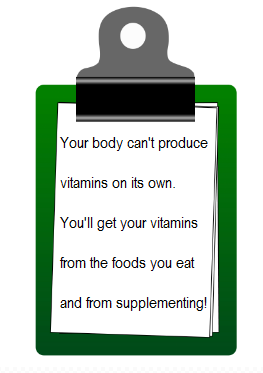|
Facts About Vitamins | What is a Vitamin?
A vitamin is a nutrient required by a living individual (organism). In other words, a nutrient is called a vitamin when it cannot be produced in sufficient amounts by the living individual and must be obtained from the diet. A common misconception is that our bodies are able to produce vitamins internally on its own. That is not true! The human body does not produce most vitamins. I say most because some (but very limited amounts) of B vitamins are made in the intestines. Vitamins support healthy body functions, help your body use the food you eat, and stimulate many necessary chemical reaction in the body. This serves as the bases for why we need to supplement. We get the vitamins that our bodies regularly need from the foods we eat and from dietary supplements. Some doctors will recommend taking vitamin supplements for several health benefits, depending on what your needs are. Water Soluble vs. Fat Soluble Vitamins…What’s The Difference?Water soluble vitamins are vitamins that dissolve in water. B vitamins and vitamin C are water soluble vitamins. The ability to dissolve in water means that large amounts of these vitamins are less likely to harm you because they can't be stored in your body. If you take more than you need, you will simply pee out the excess. That's good news because there is practically no side effects of overdose. This is part of the reason why vitamin C is the most popular vitamin supplement! The bad news--because water-soluble vitamins are less stable in foods, their nutrients is easily lost in food preparations (cooking and processing), making deficiencies very common. A supplement is often required to protect yourself from having too little of these vitamins.
The digestion of fat soluble vitamins like vitamin A, vitamin D, vitamin E, and vitamin K is improved when they are consumed with fat. The fat helps break down the vitamins so that our bodies can better absorb them. Fat soluble vitamins are stored in our fatty tissue. Because fat-soluble vitamins are stored in the body, overdoses of these vitamins can be potentially dangerous.
|
Search This Site

About the Author

Must Reads
Getting Answers to Some Health Concerns






